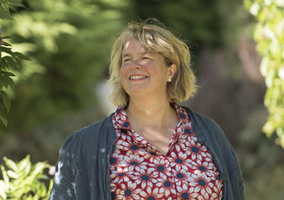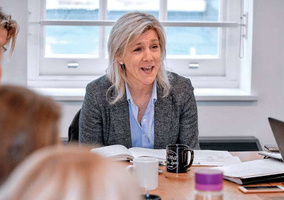Paul Farmer is one of the longest-serving leaders in the charity sector. After leading the mental health charity Mind for 16 years, he joined Age UK as chief executive in October last year.
Farmer has been pleased to see the sector grow during his career and observed increased collaboration between charities.
However, he recognises that many charities are under a “huge amount of pressure” during the cost-of-living crisis and is focused on preventing Age UK’s network of local organisations from closing amid increased need for their services.
Feeling at home
Farmer has worked in health and emotional health charities since the 1990s, but he did not originally intend to work in the sector. He did not have a plan after college and was not sure what to do.
“To some extent, I came into the charity sector because I knew I didn’t want to work in either the public or the private sectors so there wasn’t a lot of choice in-between,” he says.
He first came into contact with charity when he “luckily fell” into a job at a small charity in Clerkenwell, north London, that was doing heritage and education work.
It was during his time as a press officer at Samaritans, though, that Farmer found his path, he says. “I got to Samaritans and realised, ‘this is the kind of place where I really feel at home’”.
Mental health is a subject close to Farmer’s heart. His mother experienced what is now known as depression and anxiety. “Nobody really talked about that, she certainly didn’t,” he says.
Farmer also remembered feeling “pretty helpless” when a friend at university suffered a breakdown and he did not know what was happening or what to do.
These experiences left their mark on Farmer and made him realise why it is important to raise awareness and tackle stigma surrounding mental health issues.
Collaboration has improved in the sector
When it comes to the charity sector as a whole, Farmer believes that it has positively evolved over the years.
“There used to be too much competition and not enough cooperation and collaboration,” he says. “Of course, there will be times when we might compete. But actually, when we collaborate and work together, we can achieve much more. A lot of what we do is done really well when we’re collaborating.”
Farmer gives the examples of the UK’s first multi-charity retail store that opened in January as a month-long pop-up store in Brent Cross Shopping Centre in London and the Big Help Out that will take place on 8 May to mark King Charles’ coronation.
“It’s absolutely heaving. There’s something really interesting about what we can do when we work collaboratively in that space. Those kinds of initiatives have become much more of a part of the way in which we work as a sector.”
He adds that the sector has “grown”, having more reach and working in a large number of communities. However, he says it can be difficult for people outside the sector to appreciate its work.
“Sometimes people outside of our world don’t necessarily see the breadth and depth of what we do in terms of providing support to so many people and addressing so many issues.
“We’re really clear that our job is to speak truth to power. As a sector, we do that very strongly and very well. Sometimes people don’t always listen but I don’t think that means we’re not communicating the views of the people we’re here to serve. Our ability to do that is positive.”
‘Nowhere near where we want to be’ on diversity
Farmer says charities must have “a breadth of voices” and expertise among their staff to better empower their beneficiaries.
At Age UK, he says, “you’ll see different people popping up in different media places and I think that’s absolutely the right thing to do”.
“I’m going to do my bit but I’m not turning up all the time. That spread of voices is quite important, particularly when we’re thinking about diversity and how organisations come across to people.”
Farmer says that some individuals might find it harder to connect to Age UK if he as a white man did most of its external engagement.
“It’s really important that we have that diversity of people representing us. For us, the most important thing is to make sure that older people’s voices are heard and listened to in the conversations that are taking place, whether it’s about the next election or the future of health and social care. Our job is to make sure that we’re reflecting and amplifying people’s voices.”
He reckons that all charities still have “a huge job to do to genuinely broaden” diversity among their volunteers and staff, especially when it comes to recruiting people of colour.
“We’re still nowhere near where we want to be. Organisations have really got to think hard about that.”
Farmer says: “The civil society concept is that voluntary organisations are there with and on behalf of the whole society. So, we can’t truly say that we are if we’re not reflecting the diversity of the communities we’re here to serve.”
One step Age UK has been taking to address the issue is to run a trial of complete anonymisation of applications it receives.
Farmer explains that the initiative has had a different effect in terms of the people the charity recruits and adds that he also saw a similar thing at Mind.
“I think the conclusion that you draw from that is that there’s definitely unconscious bias at play. But it’s more than that, it’s about how organisations think about their approachability and the conversations they have with different communities.”
While recently visiting the local Age UK charity in Tameside, Farmer says he was “struck by a brilliant project” it has been running with older Gujarati-speaking women to deliver maintenance cognitive stimulation therapy, which targets people living with mild to moderate dementia and helps maintain memory and mental functioning.
Tameside has a large Gujarati-speaking community. Farmer says that the local Age UK team listened to the community in order to make the programme more accessible to people whose first language may not be English.
“That’s great and it shows that it’s a very thoughtful way of helping people to benefit from a programme. You start with community conversations and build on that to make sure that our organisations aren’t deterring people because of the way we look or behave.”
‘Rollercoaster’ of Covid-19
Age UK’s accounts for the year ending 31 March 2022 show that total income increased to £73.5m from £71.8m the previous year, with charity shops bringing in £32.8m compared with £11.4m.
Farmer was not at the helm of the charity when Covid-19 began but he knows that “the rollercoaster” of the pandemic has created a huge amount of unpredictability and uncertainty.
“Generally, I suppose, lots of people think that Covid-19 is over but I can assure you from the work we’re doing that it isn’t, particularly for a lot of older people.”
In 2021-22, 61% of the charity’s gross income came from fundraising activities and raised over £77m. Nonetheless, fundraising in the previous financial year was “notably higher” at £87m, which the charity says was largely due to the fundraising success of its Covid-19 emergency appeal.
Farmer observes that people have been “extraordinarily supportive and generous” and that without them the charity would not be where it is today.
“The really interesting point for me has been the positive response we’ve seen in charity retail. At the start of Covid-19 – and Age UK was no exception to this – the charity retail model was in a dire position because shops were shut and prior to things like the furlough scheme charity retail suddenly lurched from being an income generator to being a huge draw down on organisations’ reserves.
“What we’re now seeing is a bit of a revival in charity retail and that’s great. That’s certainly helped us deliver a better position than we were expecting.”
On the fundraising side, he says: “We’re still in the middle of this rollercoaster and I’m not quite sure that many chief executives or organisations know where this is going to land.
“We’ve gone straight from coronavirus into a cost-of-living crisis and with people’s finances stretched, we don’t yet know what the impact will be on donations over the longer term.”
A difficult year ahead
Farmer says he feels privileged to run Age UK’s federated network of charities. For him, federations are “fantastic ideas” that put local people and communities at the heart of everything they do.
Given the current economic climate, he argues that it is crucial to support them from the centre. “At any one given time, the chances are that there will be organisations at local level that are at risk and our job is to make sure we’re providing the right kind of support to them.
Just before Christmas, the charity announced a £5.3m cost-of-living response fund for its local Age UKs. “It was apparent as soon as I arrived what impact the cost-of-living crisis was having on older people and their ability to get the support they needed from local Age UKs,” Farmer notes.
The fund might support local Age UKs to provide free transport for older people who need to access their services or free hot lunches for individuals that were previously asked to make a financial contribution, among other things.
Farmer adds: “We know the cost-of-living crisis is having an impact on local organisations themselves as well. The sector generally is under a huge amount of pressure and it’s a combination of increasing demand on the needs that we’re able to provide – we’ve seen that right away across our services – and the tightening of resources.
“I’m sure a number of local Age UKs will find this year very difficult but our plan is to make sure we’re working as closely as possible as we can together. I’m hopeful that we won’t lose any.”
Charities needed now more than ever
Farmer believes that the current challenges facing society mean that “there has never been a more important moment for civil society organisations to be shaping the future”.
Ahead of the next general election, he says Age UK will do its best to ensure the difficulties it is experiencing, as well as those of its beneficiaries, are heard.
“There’s so much challenge that so many people are facing, whether that’s the consequences of online harm and abuse, Covid-19 or the cost of living. There are so many things that we need to do,” Farmer says.
“Charity’s voices are so important in bringing some of those conversations together. I can sense that as a group, we’re restless to get involved to help shape that conversation. We’ll do that because that’s our job, trying to make sure that the voices of people are being heard.
“We’re all here to shape a better world. Having seen that locally, nationally and internationally, I’m a firm believer that the charity sector has got a huge role to play in this. And in some cases, we’re better placed to support people than either the public or the private sectors.”
Related articles












